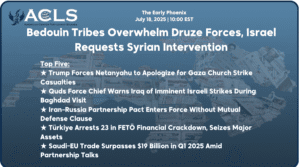TOP HEADLINES:
- Netanyahu Vows to Continue Rafah Fight With or Without U.S. Arms Support
- Iranian Politician Says Tehran May Already Have Nukes
- Iraqi PM Calls for End of UN’s Iraq Mission by 2025
- UAE Leads UN Resolution to Admit Palestine as Full Member
- Egypt Says Israel in Violation of Camp David Accords
=======================
★ ISRAEL & PALESTINIAN TERRITORIES
Netanyahu Vows to Continue Rafah Fight Regardless of U.S. Arms Support
Israeli Prime Minister Benjamin Netanyahu has pledged to continue operations against Hamas despite U.S. President Joe Biden’s threat to withhold arms for Israel’s planned military assault in Rafah. Netanyahu declared Israel’s willingness to proceed independently if necessary. Concurrently, U.S. officials, including Secretary of Defense Lloyd Austin, have halted arms deliveries designated to Israel, reflecting unprecedented divisions in the US-Israel relationship.
Hamas Demands 3-Month Ceasefire, Stalling Negotiation Progress
Hamas has proposed a 12-week ceasefire, doubling their previous six-week truce request, thereby halting progress in peace negotiations in Cairo, according to CNN. This new demand, which contradicts earlier agreements, has been rejected by Israel, viewing it as an effective cessation of the conflict. U.S. officials suggest that this shift in Hamas’ stance might reflect a lack of coordination with their leader, Yahya Sinwar. The extended ceasefire would include ongoing humanitarian efforts and a halt in military activities, which Israel opposes without the release of hostages.
Hamas Says Israel is Responsible for Rejecting Truce Proposal
Hamas stated that Israel has effectively rejected a truce proposal offered during negotiations in Cairo, placing the onus on Israel to advance peace efforts in Gaza. Despite the agreement among Palestinian factions on the mediators’ proposal, Israel has voiced significant reservations, particularly concerning the terms for hostage releases. The talks have paused, with both delegations withdrawing for further consultations.
US Proposes Alternatives to Israel for Targeting Hamas in Rafah
The White House announced that President Joe Biden has directed his team to assist Israel in effectively countering Hamas without escalating civilian casualties. Although no final decision has been made on resuming weapon shipments, the US has offered Israel strategic alternatives for pursuing Hamas operatives. This development follows the suspension of heavy bomb deliveries used in Gaza, which Biden stated had resulted in significant civilian loss.
Blinken’s Congressional Report Will Criticize Israel but Won’t Accuse IDF of Misusing U.S. Weapons
Secretary of State Anthony Blinken will present a report to Congress criticizing Israeli actions in Gaza without accusing Israel of misusing American weapons, Axios reports. This assessment, part of a broader review under a new national security directive, evaluates compliance with international law and humanitarian aid processes in conflict areas, including Israel. Despite internal debates, Blinken’s report will not conclude any violations of international law by Israel.
White House Claims Israel’s Rafah Operation Will Make Hamas Stronger
The White House strongly denied weakening Israel’s position by threatening to withhold military aid if Israel proceeds with a major offensive in Rafah. White House spokesperson John Kirby said such actions would instead strengthen Hamas’s position in hostage negotiations, contrary to aiding Israel. The administration insists its stance does not signify abandoning Israel but seeks a more strategic approach to depleting Hamas without escalating military conflict, especially given the significant impact of past conflicts on civilian lives and regional stability.
Israel’s Fiscal Deficit Surges to Record $35.7 Billion
Israel’s fiscal deficit has escalated to a record $35.7 billion, reaching 7% of GDP as of April, surpassing the previous year’s $31.6 billion mark, the Ministry of Finance reports. This increase exceeds the government’s annual target and is unprecedented since the 2008 financial crisis. The Accountant General forecasts further growth in the deficit, potentially hitting 8% by year-end. This fiscal strain coincides with extensive costs from ongoing military operations and the humanitarian impact in Gaza.
=======================
★ IRAN
Iranian Politician Says Tehran May Already Have Nukes
Iranian lawmaker Ahmad Bakhshayesh Ardestani suggested that Iran might already possess nuclear weapons, according to comments he made to a local news website. This statement follows remarks by senior advisor Kamal Kharrazi hinting at a change in Iran’s nuclear policy if Israel attacks its nuclear facilities. Ardestani believes that possessing nuclear capabilities aligns with Iran’s need to match the power of countries like the US and Israel. Despite longstanding claims of a peaceful nuclear program, Iran has enriched uranium to levels suggesting weaponization potential.
Khamenei Reportedly Will Tap Ghalibaf as Iran’s Parliament Speaker
Supreme Leader Ali Khamenei has reportedly assured Mohammad Bagher Ghalibaf of continued leadership as the Speaker of Iran’s Parliament. Cleric Abbas Amirifar revealed that despite significant pressure from hardline MPs and Ghalibaf’s own resignation considerations, Khamenei’s intervention suggests stability in his role.
Iran Conducts Runoff Elections for Parliamentary Seats, but with Record Low Turnout
Iran held its runoff parliamentary elections, with Supreme Leader Ayatollah Seyed Ali Khamenei voting early in Tehran. Ninety candidates vied for 45 seats across 22 constituencies, necessitated by no candidate achieving a majority in these areas during the initial March 1 elections. Khamenei said voting is a “national duty,” but popular disillusionment may result in minimal participation in Iran’s May 10 parliamentary runoff. Gholam Ali Rajaei, an aide to a former president, predicts a record low turnout, citing the electorate’s frustration with economic challenges and dissatisfaction with the limited impact of elected officials. Observers note a continuing trend from the March elections, which had historically low engagement.
Iran Exploits Global Attention on Gaza to Advance its Nuclear Program
Iran is exploiting global attention on the Gaza conflict to accelerate its nuclear ambitions, despite asserting peaceful intentions. Kamal Kharrazi, advisor to the Supreme Leader, hinted at a shift to nuclear armament if Iran feels threatened by Israel. Meanwhile, former U.S. intelligence chair Peter Hoekstra expressed uncertainty about the timeline for Iran’s nuclear capabilities, though some believe it could be imminent. IAEA Director Rafael Grossi’s recent visit aimed to enhance oversight but faced challenges, including a direct attack by Iran on Israel in April, escalating regional tensions.
Supreme Leader’s Office Says Iran’s Economy is Reeling Under Sanctions Pressure
Iran’s economy is reeling from the impact of international sanctions, with the Supreme Leader’s chief of staff, Gholamhossein Mohammadi Golpayegani, acknowledging the significant challenges they pose. He expressed confidence that the government could mitigate these issues. This comes as Iran reports a staggering 52.3% inflation rate for 2023, along with severe shortages, including of gasoline, despite its abundant oil reserves. The sanctions are tied to Iran’s nuclear ambitions and support for militant groups.
=======================
★ IRAQ
Iraqi PM Calls for Conclusion of UN’s Iraq Mission by 2025
Iraqi Prime Minister Muhammad Shia al-Sudani has formally requested the United Nations to terminate the mandate of the United Nations Mission in Iraq (UNAMI) by late 2025. In communications with the UN, Al-Sudani highlighted Iraq’s readiness to end the mission, emphasizing continued cooperation with 22 international agencies under the resident coordinator mechanism. Despite facilitating a strategic review as per Security Council resolutions, Al-Sudani criticized the report for not adequately distinguishing between governmental and non-governmental perspectives on the mission’s future.
Iran-Backed Iraqi Militants Threaten Retaliation Following Israeli Strike in Damascus
Following an Israeli airstrike on its facilities in Damascus, the Iraqi Al-Nujaba Movement vowed retaliation, warning of potential deep strikes within Israel. The Syrian Defense Ministry reported intercepting some missiles from the attack, which reportedly targeted a cultural center and a training camp in the Sayyida Zeinab area. The Syrian Observatory for Human Rights confirmed the strike and noted material damage, with ambulances seen heading towards the impacted sites. This escalation marks the third Israeli strike on militia targets in Syria during May.
Iran Reportedly Assures Barzani it Won’t Bombard Kurdistan Again
Nechirvan Barzani, President of the Kurdistan Region, received assurances from Tehran during his visit that Iran would cease its bombing operations in the region. Barzani’s trip, initiated by an invitation from Supreme Leader Ali Khamenei, also addressed security agreements and disputed the presence of Israeli operations in Kurdistan, emphasizing a diplomatic approach over military action. However, concerns persist about the reliability of Iran’s commitments given its history of unfulfilled promises and regional interference.
Iraq and Turkey Activate Land and Railway Transport Agreement
The Iraqi Ministry of Transport has announced the activation of a crucial land and railway transport agreement with Turkey, linking Iraq to the Transit International Transport Agreement (TIR). This move, chaired by Transport Minister Razzaq Muhaibas Al-Saadawi, is set to enhance trade routes and significantly bolster economic ties between the two nations. The agreement facilitates the development of a transport corridor that will not only create 100,000 job opportunities for Iraqi youth but also connect Iraq more closely with Europe and the Caucasus.
=======================
★ YEMEN
Houthi Leader Says Group Has Attacked 112 Maritime Targets Since November
Abdul-Malik Al-Houthi, leader of the Houthi group, declared that they have attacked 112 Israeli, American, and British ships since November 2023, as retaliation against Israeli actions in Rafah, Gaza. These maritime operations included the launch of ballistic and winged missiles and drones, with direct hits claimed on three Israeli ships. Al-Houthi emphasized the group’s support for Gaza against what he described as a devastating Israeli war, vowing to continue these strikes as part of broader escalatory measures against Israeli and associated Western maritime interests.
Houthis Using Communications for Surveillance in Yemen
The Houthi militia has consolidated control over Yemen’s telecommunications sector, turning it into a tool for financial gain and surveillance, impacting citizens’ privacy and freedom. According to expert reports, including one from Record Future, the Houthis exploit this sector to spy on opponents, intercept communications, and enforce censorship. Financially, the militia garners substantial revenue from taxes, licensing fees, and controlled expenses, amassing billions in Yemeni riyals annually. This strategy not only strengthens their war efforts but also reinforces their media influence by restricting access to non-Houthi information sources.
=======================
★ SYRIA
US Reiterates Firm Stance on Non-Normalization with Syrian Regime
The US State Department confirmed to Syria TV that the US policy towards Syria remains unchanged, emphasizing ongoing sanctions, including the “Caesar sanctions,” against the Syrian regime. A State Department spokesman said the US has no plans to normalize relations with Assad’s government and will continue focusing on key issues such as maintaining stability, expanding ceasefires, combating Captagon smuggling, and seeking a political resolution under Security Council Resolution 2254. This statement after the White House reportedly a Congressional measure to prohibit normalizing relations with Syria.
Tensions Rise Between Assad Regime and Local Population in Southern Syria
In April 2024, the situation in south Syria remained precarious. The Assad regime and Iranian-backed militias increased their presence in Suwayda province, raising concerns about a potential violent crackdown on the persistent anti-regime protests there. Although negotiations between regime representatives and local Druze leaders have so far prevented violence, the atmosphere remains tense, with local armed groups preparing for potential conflict. In Daraa, violence escalated when an ISIS cell attacked a joint headquarters occupied by regime and Hezbollah forces in Al-Sanamayn, resulting in a six-hour firefight that left at least 20 people dead, many of them civilians. This incident is part of a broader and ongoing conflict in the region that pits local extremist groups against Hezbollah and regime forces.
Syrian Think Tank Assesses Big Obstacles to Revitalizing Assad Regime’s Industrial Sector
The Jusoor Center for Studies highlights four significant challenges impeding the Assad government’s efforts to revitalize Syria’s industrial sector. These include issues with government functionality, problematic rhetoric, adverse economic conditions, and misguided priorities focusing on war efforts rather than industrial development. Despite numerous governmental meetings and a Russian grant aimed at boosting agriculture-based industries, the reality shows a decline in industrial productivity and a lack of substantial support, with many factories at risk of shutting down due to high operational costs and insufficient government backing.
Dire Economic Strains on Assad Regime Employees
An economic expert reveals the severe financial challenges faced by employees of the Assad regime, where a worker needs to labor for 80 hours just to afford a chicken. Salaries remain critically low, with the highest at $25 and the lowest at $19 per month, starkly contrasted against the high cost of living. These conditions underscore the widespread poverty, corruption, and economic deterioration in regime-controlled areas, raising significant concerns about the government’s neglect and the feasibility of proposed infrastructure projects like solar energy.
=======================
★ LEBANON
EU Pledges €1 Billion Aid for Lebanon
EU Ambassador to Lebanon Sandra De Waele urged a diplomatic resolution to the ongoing Israel-Hizballah clashes in Southern Lebanon. She announced a €1 billion EU aid package to Lebanon, addressing critical sectors beyond Syrian refugees. Acknowledging Lebanese concerns, De Waele underscored the EU’s commitment to legal pathways for refugees and border management support.
=======================
★ GULF REGION
Saudi Arabia to Reduce Crude Oil Supplies to China in June
Saudi Arabia will decrease its crude oil shipments to China by approximately 5.8 million barrels in June, totaling a reduction from 45 million barrels in May. This decision follows Saudi Aramco’s adjustment of official selling prices for its crudes to Asia, marking the highest levels in five months. The cut primarily affects Arab Medium and Arab Heavy crude varieties. Influencing this shift are the elevated prices and diminished refining margins, prompting Chinese refiners to import less.
Saudi Crown Prince Will Visit Japan for First Time Since 2019
Saudi Crown Prince Mohammed bin Salman will make his first visit to Japan since 2019 from May 20 to May 23. The visit will address Middle East and global issues. Japan, heavily reliant on Middle Eastern oil, now eyes energy investments in the Gulf, while Saudi investments in Japanese firms, notably gaming and technology, illustrate growing bilateral interests. With plans to host the Electronic Sports Games World Cup, Saudi Arabia aims to assert its global presence in the gaming industry.
UAE Leads UN General Assembly Resolution to Admit Palestine as Full UN Member
The UN General Assembly is set to endorse Palestinian efforts for full UN membership today. This move follows the US veto in the Security Council last month. While the Assembly lacks the authority to grant full membership, the draft resolution, led by the UAE, extends certain rights. Despite US opposition, diplomats foresee sufficient support for adoption. Israel and the US have expressed concerns over precedent and UN Charter violations.
China and Qatar Sign 27-Year Gas Deal
China and Qatar have deepened their economic and strategic partnership, particularly in the natural gas sector, with a 27-year agreement for China to purchase 4 million tons of liquefied natural gas annually from Qatar. This deal is part of China’s strategy to diversify its energy sources amid global economic shifts. Additionally, Qatar is enhancing its LNG transport capabilities by building 18 advanced carriers in collaboration with China State Shipbuilding Corporation, reflecting the significant role of this partnership in both nations’ energy security and economic strategies.
=======================
★ EGYPT AND NORTH AFRICA
Egypt Says Israel in Violation of Camp David Accords, Cairo Contemplating Response
Egypt claims Israel violated the Camp David accords with its seizure of the Rafah border crossing. Egyptian political forces are advocating for robust actions against Israel, including potentially canceling the Camp David Accords and taking various political, economic, and diplomatic measures. Experts argue that this breach could threaten Egyptian national security and sovereignty in Palestinian territories. In response, suggestions include military mobilizations and increased security measures around strategic sites to send a strong message to Israel about the seriousness of the treaty violations.
Egypt Urges US Intervention Over Israel’s Seize of Rafah Crossing
Cairo has sent a letter of protest to the United States regarding Israel’s control of the Rafah crossing, arguing that it undermines Egypt’s mediation efforts in the region and poses security risks within Egypt. The Egyptian source highlighted the potential for the situation to escalate despite Israeli assurances of a limited operation.
=======================
★ TURKIYE
Turkey and USA Strengthen Energy Cooperation in Central Asia
Turkey and the USA signed a significant LNG agreement and discussed strategies to ensure energy security. In Washington, Minister Alparslan Bayraktar met with US Energy Minister Jennifer Granholm and Deputy Undersecretary Geoffrey Pyatt underscored the importance of this alliance in countering China’s growing influence. This collaboration extends to Central Asia, with both nations aiming to diversify energy supplies and enhance regional stability.
Turkey Denies Israeli President’s Claim Ankara Will Ease Trade Ban
Turkey dismissed Israeli President Herzog’s recent claims, reported in the Israeli media, that Ankara is easing trade restrictions. Turkish Trade Minister Omar Bolat said the reports are “pure fantasy” and the ban on trade with Israel will stay until Gaza’s humanitarian access improves and a lasting ceasefire is secured.
=======================
📌 In case you missed it,
📰 THE EARLY PHOENIX May 9, 2024
📰 THE EARLY PHOENIX May 8, 2024
📰 THE EARLY PHOENIX May 7, 2024
📰 THE EARLY PHOENIX May 6, 2024
=======================
🔗 Follow the latest news from the American Center for Levant Studies via Google News



